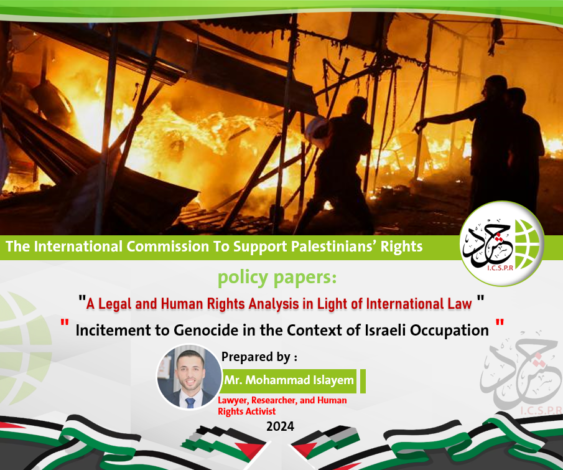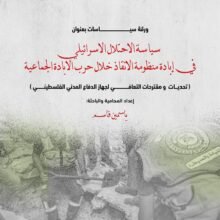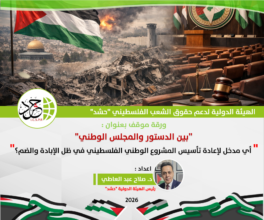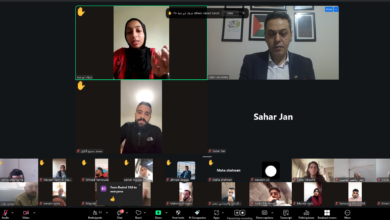
ICSPR Issues a Policy Paper Titled: “Incitement to Genocide in the Context of Israeli Occupation: A Legal and Human Rights Analysis Under International Law”
Date: April 12, 2025
Press Release
ICSPR Issues a Policy Paper Titled: “Incitement to Genocide in the Context of Israeli Occupation: A Legal and Human Rights Analysis Under International Law”
The International Commission to Support Palestinian Rights (ICSPR) has issued a new policy paper authored by lawyer, researcher, and human rights activist Mohammed Jalal Islayem, titled: “Incitement to Genocide in the Context of Israeli Occupation: A Legal and Human Rights Analysis Under International Law.”
The paper offers an in-depth legal analysis of statements made by Israeli political and military leaders during the recent 2023 aggression on the Gaza Strip, concluding that this rhetoric constitutes the crime of incitement to genocide under international law.
A Rigorous Legal Framework Governing the Crime of Incitement to Genocide
The paper begins by presenting a precise definition of genocide as outlined in the 1948 UN Convention, noting that genocide includes deliberate killing, physical or mental harm, inflicting conditions of life calculated to destroy a group, preventing births, or forcibly transferring children from one group to another. It stresses that incitement to genocide is an independent crime under Article III of the Convention—even if the act of genocide has not yet been carried out—citing the precedent set by the Rwanda Tribunal in the Akayesu case.
The paper highlights the necessity of proving specific intent—the intention to destroy, in whole or in part, a national, ethnic, racial, or religious group—which differentiates the crime of incitement from general hostile speech. It also notes that those responsible for incitement may include political, military, and media leaders, and that states may bear legal responsibility if they fail to take preventive measures against such speech.
Repeated Official Incitement by Israeli Leaders
In the second section, the paper provides a detailed analysis of inciteful statements made by senior Israeli officials during the 2023 aggression, including:
-
Israeli Defense Minister Yoav Gallant describing Palestinians as “human animals.”
-
Heritage Minister Eliyahu calling for the use of a nuclear bomb on Gaza.
-
Prime Minister Benjamin Netanyahu’s discourse on a “battle between light and darkness,” which conveys an exclusionary narrative aiming to eliminate the other.
-
President Isaac Herzog’s statement blaming all Gazans, effectively justifying collective punishment.
-
Explicit military declarations aimed at cutting off electricity and water to civilians—part of a systematic policy to impoverish, starve, and terrorize the population.
The paper evaluates these statements in terms of their public and direct nature, the general context in which they were made, and their correlation with systematic field actions such as siege, starvation, and large-scale bombardments. It also compares this rhetoric to the hate speech that preceded the 1994 genocide in Rwanda, highlighting a clear similarity in the dehumanization of victims and the creation of an environment conducive to violence.
International Accountability Mechanisms Are Possible Despite Challenges
In its third section, the paper discusses the role of the International Criminal Court (ICC), affirming that it has jurisdiction over Palestinian territories under Article 12 of the Rome Statute, and therefore may investigate crimes of incitement to genocide. It outlines potential steps in this process—from evidence collection to arrest warrants and eventual trials.
The paper also identifies challenges that may hinder justice, including opposition from some Western powers, the difficulty of proving specific intent, and the lack of political will to enforce judgments. However, it emphasizes available opportunities, such as universal jurisdiction, which allows states not directly affected by the crimes to prosecute those responsible, and the role of civil society organizations in documentation, advocacy, and international pressure.
Conclusions and Recommendations: Holding the International Community Accountable
The paper reaches several key conclusions, most notably:
-
All elements of the crime of incitement to genocide are present in official Israeli rhetoric.
-
There is a clear destructive intent against Palestinians as a protected group under international law.
-
There is a realistic possibility of applying individual criminal responsibility to Israeli political and military leaders.
-
The time has come to activate international legal mechanisms to hold perpetrators accountable.
Accordingly, the paper makes the following recommendations:
At the International Level:
-
Urge the International Criminal Court to expedite investigations and prosecute those responsible.
-
Form neutral and independent international inquiry committees.
At the Regional Level:
-
Submit collective complaints to the United Nations Human Rights Council.
-
Strengthen Arab legal diplomacy on the international stage.
At the Local Level:
-
Intensify the documentation of violations and massacres.
-
File lawsuits in national courts that allow for international criminal prosecution.
This paper serves as a qualitative contribution to the legal discussion surrounding the crime of incitement to genocide in the Palestinian context. It is a valuable documentary reference that can support international judicial efforts to pursue and prosecute Israeli leaders for their crimes against Palestinian civilians, particularly during the 2023 aggression on Gaza.





